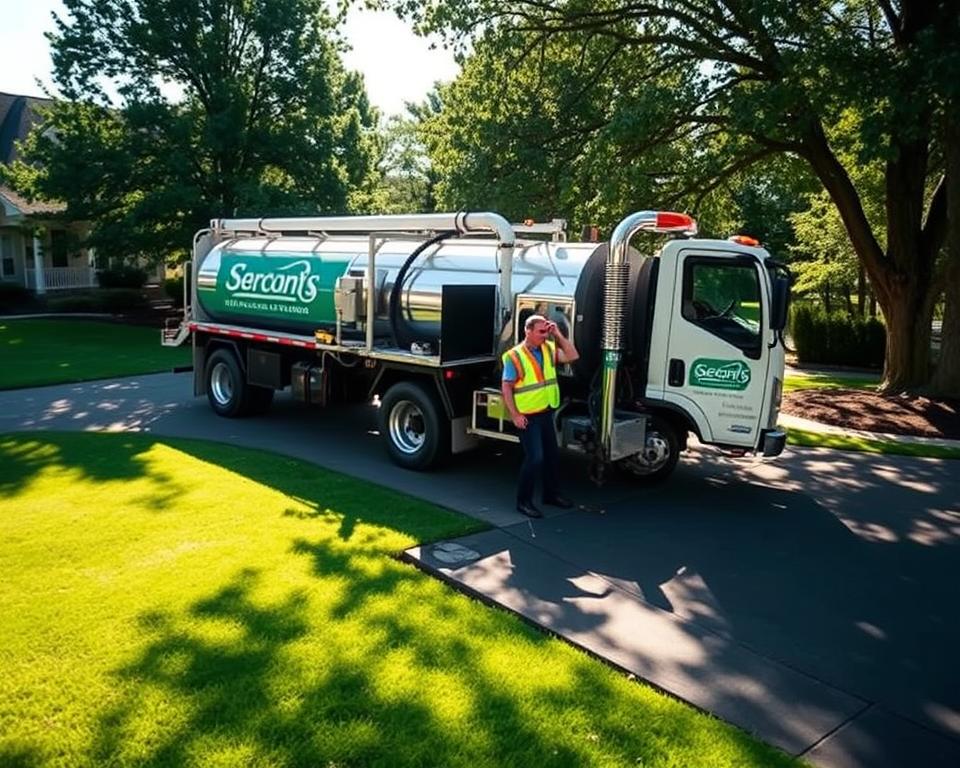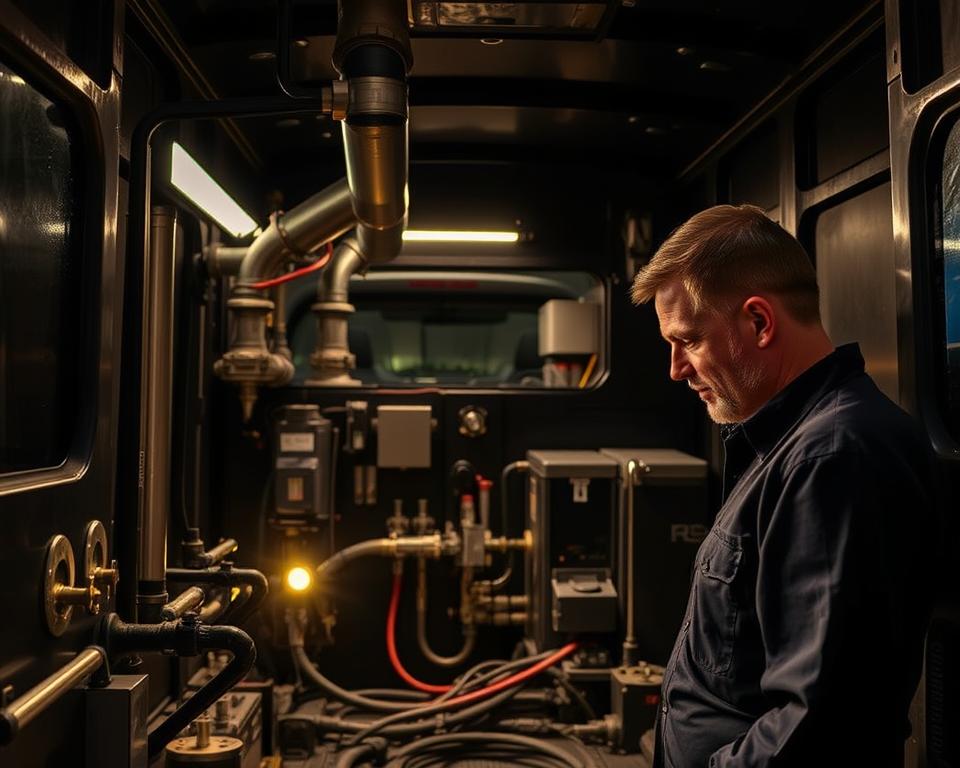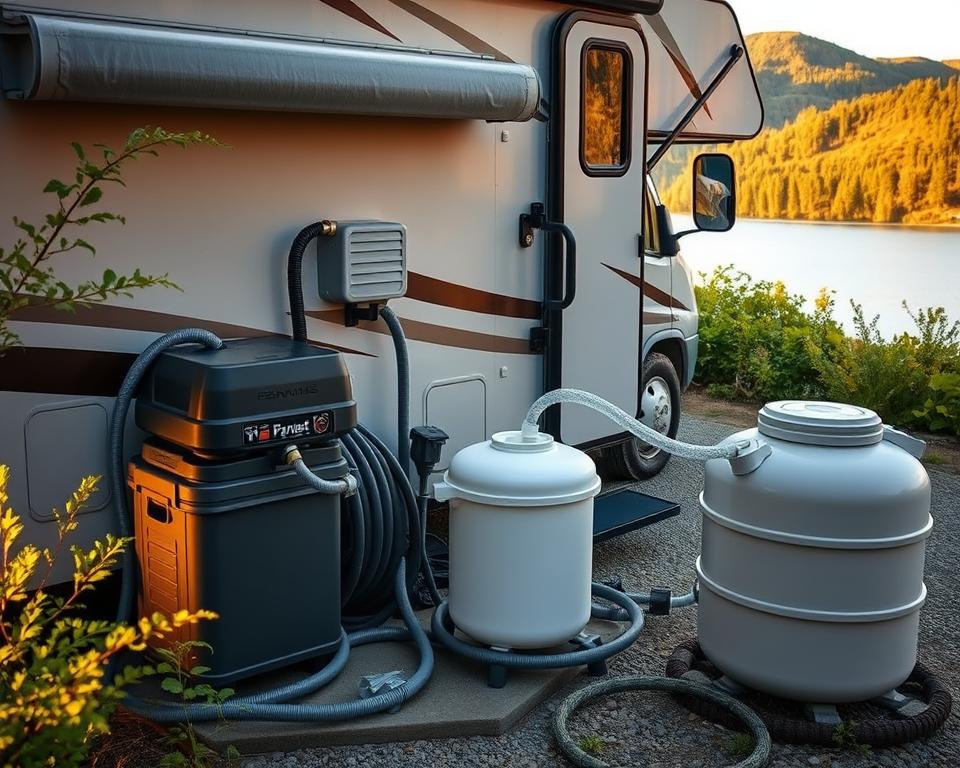RV Sewage Pump: Must-Know Maintenance Tips
Are you sure your motorhome’s black water pump is good to go, or could it result in campsite headaches? Preserving your motorhome’s waste system in top shape is critical. It prevents unpleasant aromas, clogs, and expensive damage. This guide provides indispensable advice to guarantee your sewage pump runs seamlessly, making your travels peaceful.
Grasping Your RV’s Plumbing System
The RV plumbing system is integral for any smooth journey. It splits into two main parts: the black water system and the gray water system – RV black water tank pump. The black water system captures waste from the toilet, while the gray water system manages wastewater from sinks and showers.
The systems feature drain lines that empty into different tanks, designed for optimal waste management. Each tank has a vent to prevent gas from building up, ensuring the operation is safe and odor-free. Proper waste management in an RV is critical to forestall leaks or bad odors. By knowing both black and gray water tanks, RV owners can look after and manage waste better.
Grasping how your RV’s plumbing works allows early detection of issues in advance. Regular maintenance makes trips smoother for everyone. Staying ahead with your RV’s plumbing system guarantees reliability during your travels.
RV Tank Categories
Operating RVs involves recognizing the different tanks. Each one is essential to your RV’s performance, requiring regular upkeep.
The fresh water tank stores drinking water. It’s critical for a convenient RV experience.
The gray water tank collects sink, shower, and other non-Septic wastewater. Overseeing this tank keeps your RV hygienic while traveling. The black water tank, on the other hand, contains toilet waste. It needs routine emptying and meticulous maintenance to avoid issues.
By understanding the fresh, gray, and black water tanks, RV owners can optimally control their systems. This planning and regular maintenance guarantee smooth running of the waste management system.
Operation of Black Water Tanks
The process of the black water tank is crucial in RV waste management. It stores waste from the toilet via a gravity-fed system. Upon flushing, waste and water are directed into the tank, to be stored until removal is necessary. It’s paramount to keep water levels optimized in the toilet to avoid solid waste buildup.
Understanding how RV waste tanks function can circumvent clogs and odors. Without proper care, solid waste hardens, creating blockages and emptying difficulties. Effective tank flushing techniques are vital to preventing these issues, guaranteeing smooth functionality.
Routine inspection of tank mechanics is advised for RV owners. This includes checking flushing methods and keeping adequate water flow. Mastering these essentials helps with efficient tank maintenance, averting expensive fixes later.

Vital Maintenance Tips for Your RV Black Water Pump
Doing regular maintenance on your RV’s black water pump is imperative. Begin with choosing RV-safe toilet paper to cut down clogs and enhance flow. A complete flush can eliminate waste and diminish bad smells. Regularly cleaning the tank helps stop residue buildup, guaranteeing your RV hygienic and comfortable.
Conduct regular inspections to assess your pump’s condition. Look for any signs of wear or damage that could reduce its function. Using specialized tank treatments, like those from All in Sanitation, can markedly improve both performance and cleanliness. Following these tips can lengthen your pump’s life and upgrade your RV’s living conditions.
Opt for RV-Specific Tissue
Keeping your RV’s black water system demands crucial measures. One essential tip is using RV-safe toilet paper for clog prevention. This dedicated product breaks down quickly in water, tailored for RV sanitation systems.
RV-safe toilet paper is paramount for tank maintenance. It dissolves fast, avoiding blockages from slow-decomposing materials. This boosts waste disposal efficiency and keeps the plumbing smooth.
Opt for brands identified as RV-safe when buying toilet paper. These products minimize clog risks and increase your black water tank‘s lifespan by avoiding buildup. Continual use ensures a stress-free camping experience, absent plumbing troubles.
Thorough Tank Flushing
Deep-flushing your black water tank is crucial for responsible waste management in your RV. To aid waste movement, confirm the toilet bowl is adequately filled before flushing. Many RVs are equipped with built-in tank flush systems to make the process more effective. For RVs without this feature, attaching tank rinsers that attach to the sewer outlet offers a reliable alternative.
Consistent tank flushing aids waste removal and stops solid accumulations and bad smells. Keeping up with this process secures your RV stays pleasant, making your travels more enjoyable. A focus on regular and complete tank flushing will boost hygiene and the overall condition of your RV’s plumbing system.
Keep Tanks Clear with Steady Cleaning
Holding your RV’s black water tank clear is key for its best function. Regular cleaning eliminates lingering waste inside the tank walls. This means scouring well with water and using specific RV tank cleaners for tough deposits.
By cleaning faithfully, you halt odors and lessen clog risks. A clean tank makes RVing better and helps your plumbing last longer. Include tank maintenance into your routine to deliver smooth travels.
Selecting Safe Treatments
Using suitable chemicals for RV black water pump maintenance is essential for managing waste and reducing smells. Many RV enthusiasts rely on enzyme-based RV holding tank treatments. These products feature good bacteria to degrade solids and neutralize bad odors.
Shunning harsh chemicals is critical to prevent damage to your plumbing. Such substances can corrode pipes, leading to high repair bills and diminishing your RV enjoyment. Applying safe chemicals for odor control secures your tank and pump’s longevity.
Keeping your RV black water tank in top condition boosts your travel experience. Using the right holding tank treatment periodically secures your system works well.
Timely Tank Emptying
It’s vital to empty your RV’s black water tank at the correct moment for proper dumping. Make it a goal to empty when the tank is about two-thirds full is prudent. This sidesteps solid waste buildup, ensuring a simpler emptying process.
Dumping at designated stations is critical for safe, eco-friendly waste handling. It’s vital to keep an eye on the tank‘s levels closely. Letting it fill completely can result in clogs and make disposal more difficult.
Appropriate scheduling and techniques are vital for hygienic waste management and can increase your plumbing’s life. Staying vigilant and caring for the system well delivers a pleasant RV living experience.
Seal Checks & Care
Checking seals around the toilet and tank is critical for leak prevention. Over time, these seals might break down, leading to odors and potential harm. A comprehensive inspection will reveal any wear or damage. Finding issues early allows for quick replacement to guarantee a secure connection and odor-free RV.
Holding a bit of water in the toilet bowl helps in preserving seal condition. This protective habit is vital in RV seal upkeep. It extends the seals’ life, avoiding leaks and foul odors.
Regular seal maintenance can stop pricey work later. By prioritizing seal health, RV owners deliver a pleasant journey.
Additional Tips for Long-Term Maintenance
Scheduling professional servicing for your RV at least once a year is wise, particularly for black water tank care. This strategy aids in identifying problems early and upholds your plumbing system’s integrity.
When readying your RV for storage, thoroughly clean and empty the black water tank first. Think about antifreeze to shield against damage from remaining water during cold seasons. Taking this step is important for maintaining the system, ensuring it’s ready for your next adventure.
Regular inspections and preventive actions are vital to extending your sanitation system’s life. Monitoring connections, hoses, and seals secures smooth operations. This method enhances your RV experience, making it enjoyable all year round.
Making sure your RV’s black water pump is well-maintained is vital for a stress-free camping journey. By adhering to the maintenance tips shared, you can keep your black water system functioning well. It’s important to focus on steady cleansing, applying correct flushing methods, and picking appropriate chemicals for waste management.
By meeting these maintenance requirements, you will avoid unpleasant odors and blockages. This also prolongs your RV plumbing system’s durability. Proactive care of the RV black water pump means more time enjoying the outdoors, without concern for potential setbacks.
Don’t forget, proper upkeep is key next time you gear up for an outing. It’s not the highlight of RV ownership, yet it significantly betters your travel experience.


